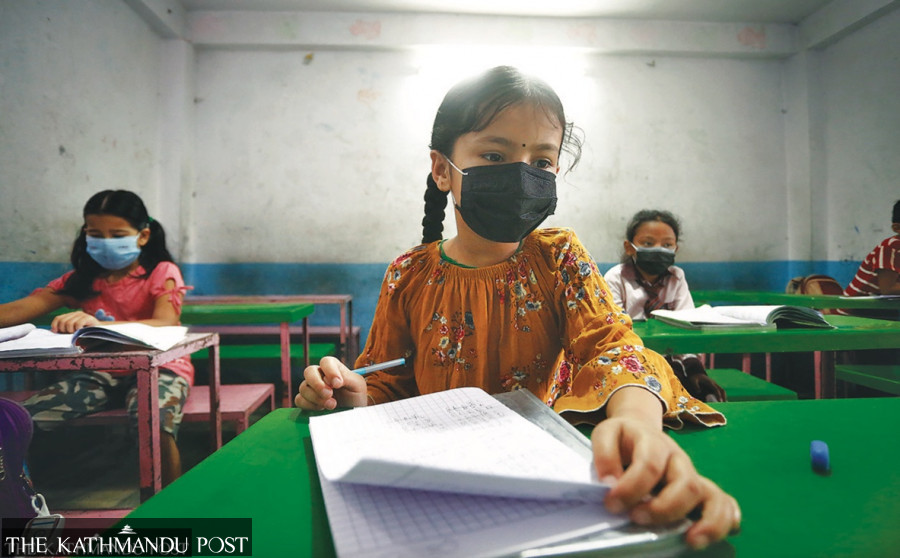Valley
Ignoring health warnings, Kathmandu city allows reopening of schools
City spokesman Dangol says individual schools can decide whether to resume physical classes.
Anup Ojha
When schools in the Capital that were closed for months due to the Covid-19 pandemic started reopening from mid-September following an ambiguous notice by the District Administration Office, Ishwar Marasini and his wife Sunita of Ranibari were worried.
Although their children’s school had not reopened, they were worried that the school would also resume physical classes sooner or later and they would have to send their children back to the school. But they were also hoping that the Kathmandu Metropolitan City may not allow resumption of physical classes at least before the Dashain festival.
But on Sunday, the City decided to allow schools to resume physical classes by following health protocols.
“Why did they need to reopen the schools when there are just 11 days to Dashain?” asked Marasini, 40, who runs a stationery shop at Ranibari. “Everyone knows the children are not vaccinated. Who will be responsible if they get infected?”
The City gave permission to schools to resume physical classes ignoring warnings by health experts, educationalists and guardians.
Kathmandu Valley’s another metropolis, the Lalitpur Metropolitan City, reopened its schools last week. In response to the Post’s questions, Lalitpur Mayor Chiri Babu Maharjan had said the City allowed physical classes by ensuring that the health protocols are strictly followed by all school staffers and students. He had admitted that his office was under immense pressure from both school operators and parents to permit physical classes.
However, many have called Kathmandu Metropolitan City’s decision to resume physical classes ‘impractical and irresponsible’ as there is less than two weeks until Ghatasthapana, the first day of the 15-day festival, when schools and colleges remain closed.
The government has already decided to open bus ticket booking for Dashain from September 27 and the Metropolitan Traffic Police Division set up 14 help desks across Kathmandu Valley on Sunday to assist people leaving for their hometowns for the festival.
Being the country’s Capital and the largest city, Kathmandu has the highest number of educational institutions and students. Over 365,000 students study in 731 educational institutions in Kathmandu Metropolitan City.
“Despite our continuous efforts we were unable to stop the City officials from taking this unwise decision to reopen schools,” lamented Suprabhat Bhandari, chairperson of Guardians Federation Nepal.
The City’s Health Department’s data showed there were 2,302 active cases of Covid-19, and 2,196 people were in home isolation until Friday. The City’s recorded Covid-19 related fatalities stood at 536.
“I just wonder why did the City decide to allow physical classes when Kathmandu is still a red zone for virus transmission, and the Health Ministry has been advising against reopening schools in densely-populated areas,” said Bhandari.
When the City was still in consultation with stakeholders regarding school reopening before Dashain, the neighbouring Madhyapur-Thimi Municipality had announced to resume schools only after the Chhath festival in mid-November.
Thimi Mayor, Madan Sundar Shrestha had announced to close physical classes as every day 4-6 persons below 18 years were getting Covid-19 infection and had opined that Kathmandu should be very serious about the issue, as it was a more ‘sensitive zone.’
Public health experts have always been saying that children are at a higher risk of transmission of virus as they are not vaccinated.
“Although we send them to school making them wear masks, it's risky as children are not conscious about maintaining social distance or wearing masks,” said Sunita Marasini, the mother of the two kids.
According to UNICEF’s report titled ‘Tracking the Socio-Economic Impact of Covid-19 on Children and Families in Nepal’ published on July 21, only 37 percent children wore a mask in public all the time while only 10 percent practiced two-metre safe distancing all the time.
When asked why the City decided to open schools ignoring health experts’ warnings, Ishwar Man Dangol, spokesperson of the City said the decision was not taken by the City unilaterally.
“The District Administration Office had already decided to resume physical classes, so we held an intensive discussion with stakeholders and decided to reopen schools by adhering to various conditions to prevent disease transmission,” said Dangol.
“But now it is up to the school management committees to decide whether to reopen the schools,” added Dangol.
Dr Sher Bahadur Pun, chief of the Clinical Research Unit at Sukraraj Tropical and Infectious Disease Hospital at Teku who has long been warning that children will be at high risk if the third wave grips the country, said the City office should have waited until after the festive season to reopen schools.
“One has to be very conscious to resume physical classes in Kathmandu as it is densely populated. The school should take extra precautions. It would have been wise to open school after the festive season is over as by then more parents will have been vaccinated,” said Pun.
The government is planning to vaccinate children aged 12 to 18 years with the Pfizer BioNTech vaccine.
Meanwhile, Bhandari of the Guardians Federation Nepal said Kathmandu mayor should be held responsible if anything untoward happens to children.




 9.7°C Kathmandu
9.7°C Kathmandu.jpg)














